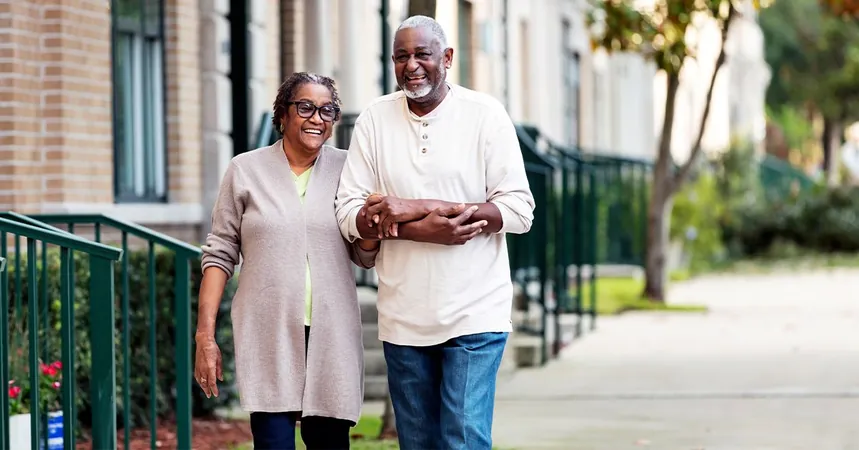
Shocking New Findings: Vitamin D Supplements Won't Prevent Falls or Fractures in Healthy Seniors!
2024-12-20
Author: Siti
Introduction
In a groundbreaking recommendation, the U.S. Preventive Services Task Force (USPSTF) has concluded that vitamin D supplements are unlikely to reduce the risk of falls or bone fractures in healthy older adults. This revelation could change how millions view supplementation as a safeguard against serious injuries.
Vitamin D's Role
While vitamin D is known for its numerous health benefits, such as improving bone strength and aiding calcium absorption, the Task Force emphasizes that it does not effectively prevent falls or fractures among healthy older populations. “Preventing older adults from falling and breaking a bone is important for their ongoing health and independence,” stated Dr. John Ruiz, a member of the Task Force. He noted that the latest evidence shows that vitamin D, taken with or without calcium, does not mitigate risks for women past menopause or men aged 60 and older.
Exceptions to the Rule
However, this recommendation does not apply to everyone. Those who are diagnosed with osteoporosis or other medical conditions may still benefit from vitamin D and calcium supplements, as these nutrients are crucial for maintaining bone health in those struggling with deficiencies. For instance, Dr. Edward Hsiao from the University of California San Francisco stressed that vitamin D supplementation is vital for individuals with bone fragility or undergoing osteoporosis treatment, as these nutrients help medications work more effectively.
Changing Recommendations
Interestingly, the draft recommendation represents an update from a 2018 report that advocated for daily vitamin D supplementation for older women. Now, the Task Force is accepting public comments on this new draft until January 21, leaving the door open for further adjustments based on community feedback.
National Concerns
A national concern arises, however, as estimates reveal that more than 40% of adults in the U.S. suffer from vitamin D deficiency, potentially exacerbating health issues. While foods rich in vitamin D, such as fatty fish, egg yolks, and fortified dairy products, can provide some nutrients, the most efficient source remains sunlight, produced from cholesterol via skin exposure.
Health Risks of Excessive Supplementation
Yet, caution is advised. Dr. Wendolyn Gozansky warned of the risks associated with excessive vitamin D intake, which can lead to adverse effects like nausea, kidney problems, and other health threats. "Vitamin D acts like a hormone in the body, impacting muscle, bone, and immune function," she explained, underscoring the necessity to consult with healthcare providers before starting any new supplement regimen.
Context of Falls Among Seniors
Diving deeper into the context of falls among seniors, the Centers for Disease Control and Prevention (CDC) report that more than 1 in 4 older adults experience falls each year, with many of these incidents leading to severe injuries. As falls often double the risk of future falls, proactive measures, including regular exercise and balance training, are paramount. The CDC suggests at least 150 minutes of moderate aerobic activity each week, complemented by muscle-strengthening exercises.
Conclusion and Recommendations
So what does this mean for older adults? It highlights the critical importance of engaging in regular physical activity, such as walking, weightlifting, or low-impact exercises like yoga and tai chi, which could provide the much-needed balance and strength to prevent falls—no supplements required!
As the debate continues around vitamin D's efficacy in preventing falls and fractures, one thing is certain: maintaining a healthy lifestyle that includes balanced nutrition and regular exercise remains the cornerstone for reducing health risks among older adults. Keep an eye out as the Task Force prepares to finalize its recommendations—your health could depend on it!


 Brasil (PT)
Brasil (PT)
 Canada (EN)
Canada (EN)
 Chile (ES)
Chile (ES)
 España (ES)
España (ES)
 France (FR)
France (FR)
 Hong Kong (EN)
Hong Kong (EN)
 Italia (IT)
Italia (IT)
 日本 (JA)
日本 (JA)
 Magyarország (HU)
Magyarország (HU)
 Norge (NO)
Norge (NO)
 Polska (PL)
Polska (PL)
 Schweiz (DE)
Schweiz (DE)
 Singapore (EN)
Singapore (EN)
 Sverige (SV)
Sverige (SV)
 Suomi (FI)
Suomi (FI)
 Türkiye (TR)
Türkiye (TR)